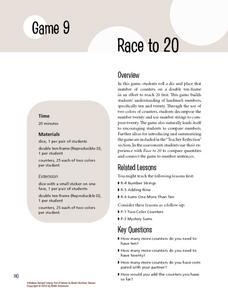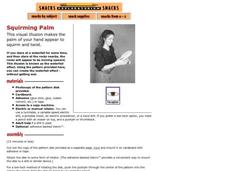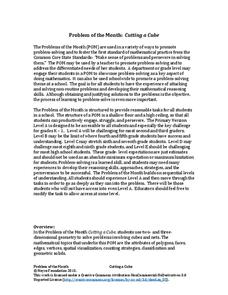Curated OER
Find Biggest Number 5
In this online interactive math skills worksheet, students examine a series of 2-digit numbers and then identify the largest number in the series. Students may submit their answers to be scored.
Curated OER
Observation Chart
In this observation chart worksheet, students after being given a subject to observe, list details for each of the five senses that are associated with the subject they were asked to observe.
Curated OER
Do Touch!
Students explore the sense of touch. They investigate unknown solids using the sense of touch. Pupils use their senses of touch to match feely gloves. Students explore body parts, by tracing their hands and feet on paper. They create a...
Math Solutions
Race to 20
And they're off! Working in pairs, young mathematicians roll dice to see who can fill in their double ten-frames first. When students finally fill in their arrays, they create addition number sentences that represent their rolls, helping...
Illustrative Mathematics
Which Number is Greater? Which Number is Less? How do you Know?
When comparing groups of objects, it's easy for children to identify which has more, but it's not so easy for them to explain their reasoning. This simple whole-group activity provides multiple opportunities for learners to compare...
Exploratorium
Thread the Needle
If you are setting up a rotation lab where learners are investigating vision at different stations, this activity can be used to explore depth perception. Setting up a giant needle eye, students attempt to pass a pencil through it with...
Exploratorium
Squirming Palm
You will need an electric drill and some Velcro™ in order to have this activity available for your class. It is, however, an intriguing display of optical illusion. After watching a spinning disk (provided), viewers look at one of their...
Curated OER
Visualization: Cricket in Times Square
After reading The Cricket in Times Square chapter titled "Caught in the Kitchen," learners list three describing details about the characters and setting. Groups collaborate to find sensory details to support their character assertions....
Exploratorium
Cardboard Tube Syllabus
Construct paper tubes and then try out a few optical illusion tricks:
See a virtual hole in your own hand
Get a grasp of how the eyes combine images
Notice that one eye is dominant over the other
Reveal how your eyes adjust to...
Exploratorium
Cheshire Cat
Divide your field of vision in two and see what happens when your two eyes behold two different scenes! This is a way to demonstrate to body-systems buffs how the two eyes usually blend pictures to create a three-dimensional view. This...
Rainforest Alliance
Sounds of the Rainforest
Do you hear what I hear? Encourage scholars to use their listening skills and participate in a series of activities that demonstrate how the sense of hearing is crucial to the human and animal world. Activities guide learners on nature...
abcteach
Community Walk
Invite your pupils to explore their surroundings with a walk around the neighborhood. Learners use their senses to make observations about their surroundings.
Mathematics Assessment Project
Middle School Mathematics Test 5
A middle school test contains two 40-minute sections covering material through algebra. All questions involve applied problem solving or mathematical analysis.
Noyce Foundation
Cutting a Cube
Teach the ins and outs of the cube! A series of five K–12 level activities explore the make-up of the cube. The beginning lessons focus on the vocabulary related to the cube. Later lessons explore the possible nets that describe a cube....
Noyce Foundation
Digging Dinosaurs
Build a function to solve problems rooted in archeology. A comprehensive set of five lessons presents problems requiring individuals to use functions. The initial lesson asks learners to find the possible number of dinosaurs from a...
Curated OER
Geography Experience: Low Vision
The world is a big and beautiful place; but how do you begin to understand it when you have low vision? Here is a great set of ideas focused on transforming any small room into a sensory paradise, themed to incite understanding about...
Noyce Foundation
Cut It Out
Explore the mathematics of the paper snowflake! During the five lessons progressing in complexity from K through 12, pupils use spatial geometry to make predictions. Scholars consider a folded piece of paper with shapes cut out. They...
EngageNY
TASC Transition Curriculum: Workshop 8
Lights, camera, action! Math educators consider how to improve their instruction by examining a model of the five-practice problem-solving model involving a movie theater. Participants examine cognitive demand in relation to problem...
Mathematics Assessment Project
Generalizing Patterns: The Difference of Two Squares
After completing an assessment task where they express numbers as the difference of squares (i.e., 9 = 5^2 – 4^2), class members note any patterns that they see in the problems.
Curated OER
An Introduction to GPS
GPS is a technological tool that has become available for use by the general public. Navigate the components and science involved in this remote sensing system. Here is a comprehensive collection of slides that would be valuable to share...
Mascil Project
Molecular Gastronomy - Science in the Kitchen
Some say cooking is an art—and a science! Scholars scope out the savory subject of molecular gastronomy with a series of related activities. The teacher's guide contains printable worksheets and helpful tips for implementing the lesson.
Curated OER
Crossword: Our Senses
For this health worksheet, learners find the words that are found in the crossword puzzle related to the topic of our senses like sight and hearing.
Curated OER
The Tongue...A Sense of Taste
Students explore the sense of taste. In this biology lesson plan, students consider 4 types of tastes, recognize the papillae or receptors on the tongue, and locate and label the different taste sense organs on the tongue.
Curated OER
The Senses
In this biology worksheet, middle schoolers find the words that are related to the senses and the answers are found at the bottom of the page.

























